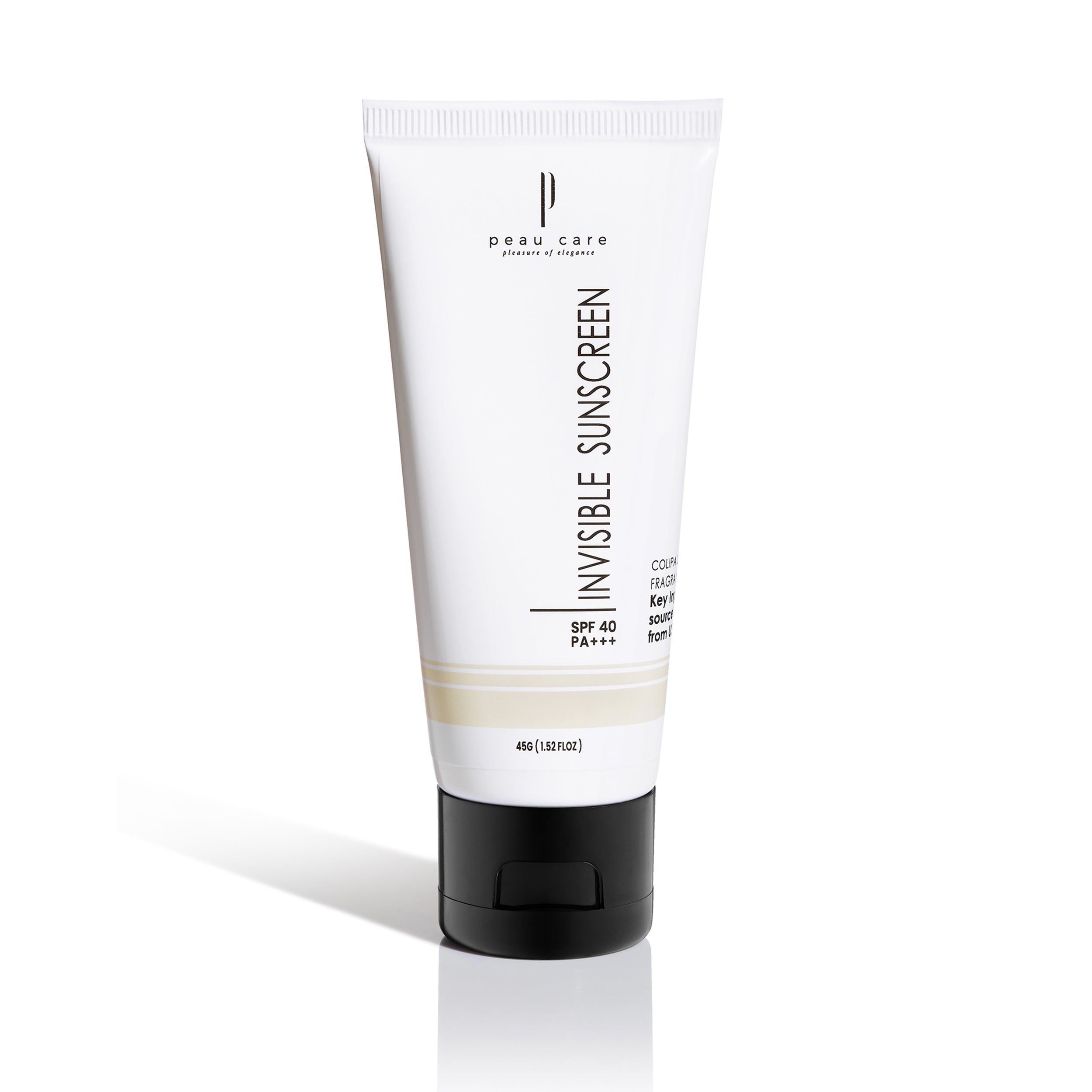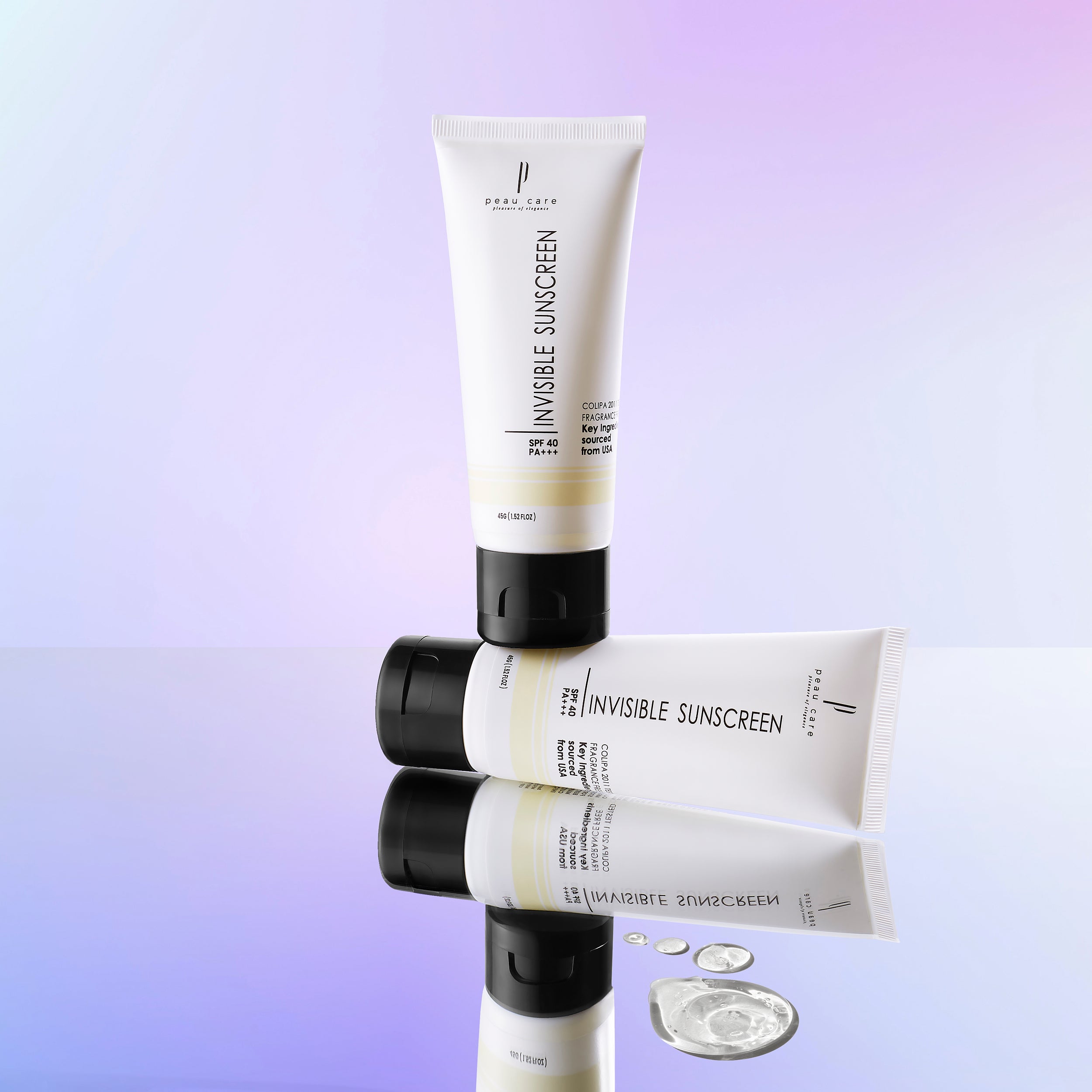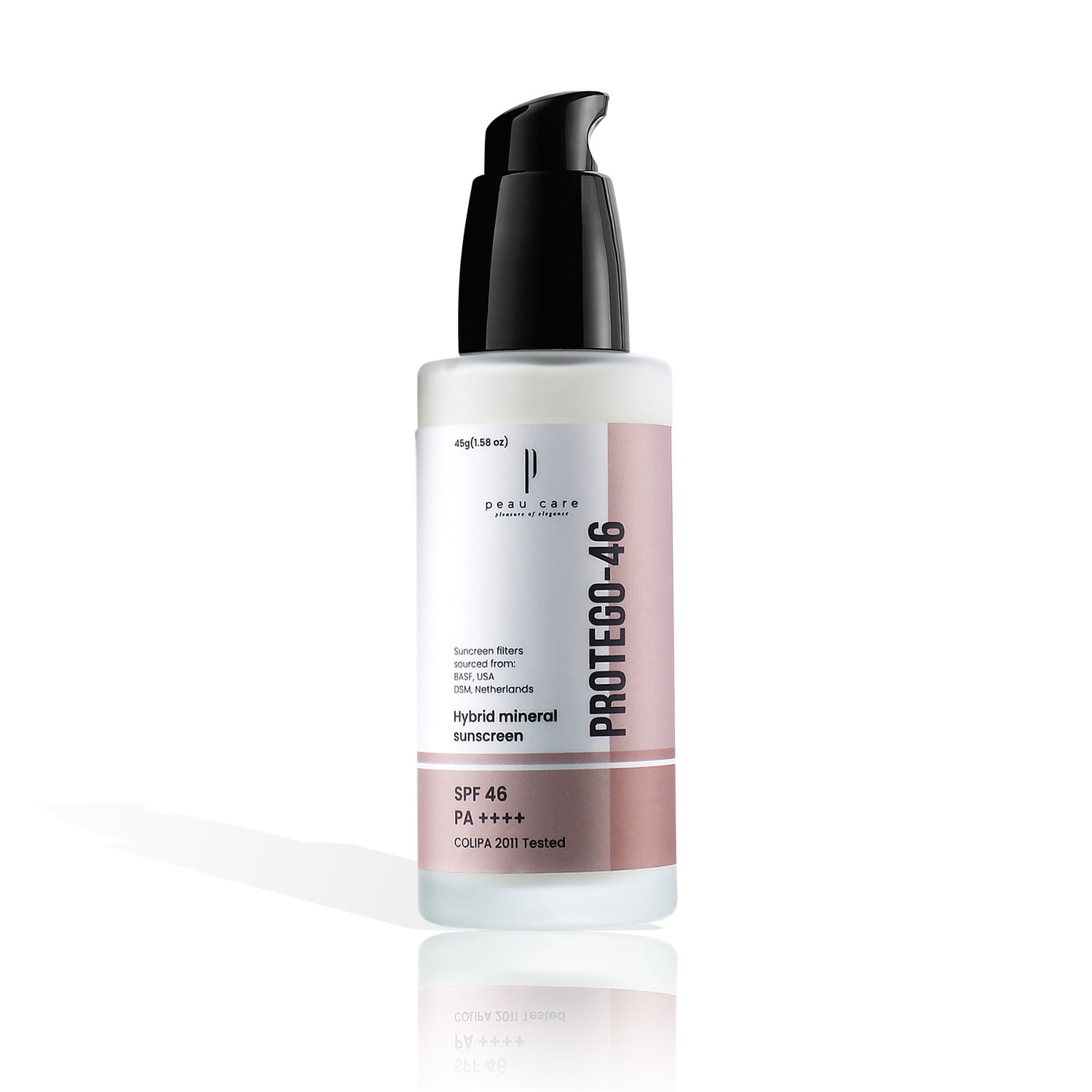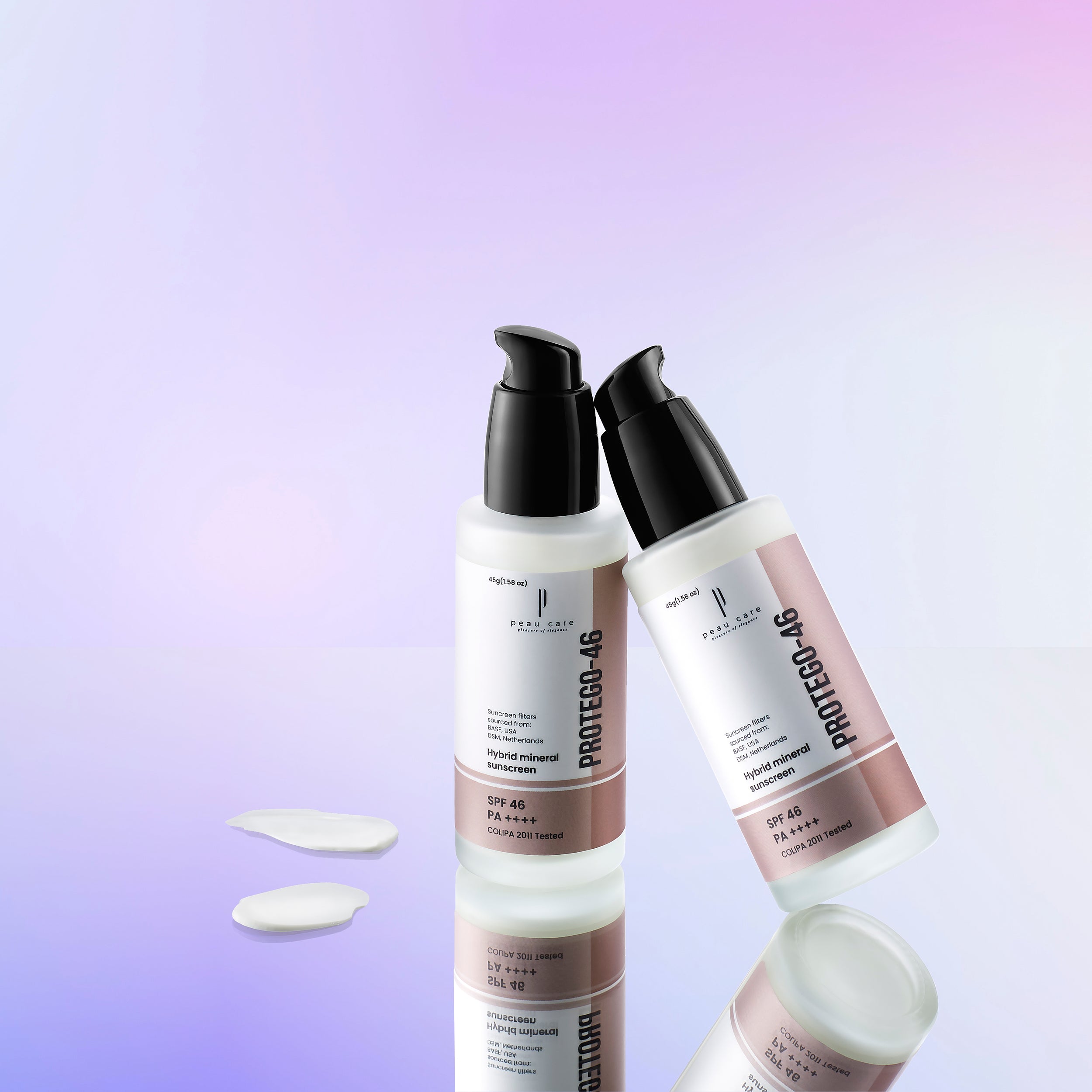
Buy SUNSCREEN
Sort by
2 products
Filters
Introducing two indispensable skincare solutions meticulously tailored to target specific skin concerns: Invisible Sunscreen SPF 40 PA+++, meticulously formulated for oily skin types to deliver effective sun protection without clogging pores, and Acne Guard 2% Salicylic Acid Cleanser, expertly crafted to gently combat acne and blemishes while rejuvenating the skin. These best sunscreen creams come highly recommended by dermatologists, are cruelty-free, and are devoid of parabens, sulfates, and fragrances, ensuring a gentle yet potent skincare regimen for those with oily or acne-prone skin. Elevate your skincare routine with these trusted solutions and unveil a clearer, healthier-looking complexion with each application.
Benefits of Using Sunscreen Cream:
Sunscreen for face isn't just a seasonal accessory but a vital component of daily skincare. Here are the key benefits of incorporating sunscreen cream into your skincare regimen:
1. Protection Against Harmful UV Rays:
The best sunscreen for face shields your skin from the damaging effects of both UVA and UVB rays. UVA rays penetrate deep into the skin, leading to premature aging, while UVB rays primarily cause sunburn. By blocking these harmful rays, sunscreen cream helps prevent sunburn, and sun damage and reduces the risk of skin cancer.
2. Prevents Premature Aging:
Exposure to UV rays accelerates the aging process of the skin, resulting in wrinkles, fine lines, and sagging. Sunscreen cream acts as a barrier, preventing UV-induced damage and preserving the skin's youthful appearance. Regular use of sunscreen for face can help maintain skin elasticity and firmness, keeping premature aging at bay.
3. Reduces the Risk of Skin Cancer:
Prolonged exposure to UV radiation is a significant risk factor for developing skin cancer, including melanoma, basal cell carcinoma, and squamous cell carcinoma. sunscreen cream forms a protective barrier on the skin, reducing the absorption of harmful UV rays and lowering the risk of skin cancer. It is especially crucial for individuals with a family history of skin cancer or those with fair skin.
4. Prevents Sunburn:
Sunburn not only causes discomfort but also damages the skin's cells and DNA. Sunscreen for oily skin with a high SPF (Sun Protection Factor) effectively blocks UVB rays, preventing sunburn and the associated pain and peeling. By applying sunscreen regularly, you can enjoy outdoor activities without worrying about sunburn ruining your day.
5. Maintains Even Skin Tone:
Sun exposure can lead to the development of dark spots, pigmentation, and uneven skin tone. The best sunscreen cream helps to inhibit the production of melanin, the pigment responsible for skin darkening, thereby preventing the formation of dark spots and maintaining a more even complexion. Incorporating sunscreen cream for face into your skincare routine can help fade existing pigmentation and prevent new spots from forming.
How to Use Sunscreen Cream:
Proper application of sunscreen cream for face is crucial to ensure maximum protection against UV damage. Follow these steps to effectively use sunscreen:
1. Choose the Right Sunscreen:
Select a broad-spectrum of the best sunscreen for face that offers protection against both UVA and UVB rays. Look for a sunscreen for sensitive skin that complies with COLIPA 2011 guidelines to ensure its effectiveness and safety. Additionally, opt for a non-greasy formula to avoid a heavy or oily feel on the skin.
2. Apply Sunscreen Generously:
Before sun exposure, apply sunscreen liberally to all exposed areas of the skin, including the face, neck, arms, legs, and any other uncovered areas. Use enough sunscreen for face to form a uniform layer, ensuring thorough coverage.
3. Reapply Sunscreen Regularly:
Sunscreen efficacy diminishes over time, especially with exposure to water, sweat, or friction from clothing. Reapply sunscreen every two hours, or more frequently if swimming or engaging in activities that cause excessive sweating. Be diligent about reapplication to maintain continuous protection throughout the day.
4. Use Sunscreen Daily:
Make sunscreen cream for face a daily habit, regardless of the weather conditions or your planned activities. UV rays can penetrate clouds and windows, so even on cloudy days or when indoors, your skin is still at risk of sun damage. Incorporate sunscreen for oily skin into your morning skincare routine to ensure consistent protection.
5. Combine Sunscreen with Other Sun Protection Measures:
While sunscreen is essential, it should not be the sole method of sun protection. Wear protective clothing, such as wide-brimmed hats, sunglasses, and long-sleeved shirts, when spending extended periods outdoors. Seek shade during peak sun hours, typically between 10 a.m. and 4 p.m., to minimize direct sun exposure.
KEY INGREDIENTS:
The effectiveness of sunscreen lies in its formulation, particularly the choice of key ingredients. Here are the essential ingredients found in the best sunscreen cream formulations compliant with COLIPA 2011 guidelines:
1. Silicone-based Ingredients:
- Cyclopentasiloxane and Dimethicone Crosspolymer create a smooth, non-greasy texture that glides effortlessly onto the skin, ensuring even application and comfortable wear.
2. UV Filters:
- Ethylhexyl Salicylate, Butyloctyl Salicylate, Octocrylene, Butyl Methoxydibenzoylmethane, and Homosalate provide broad-spectrum protection against both UVA and UVB rays, safeguarding the skin from sun damage and premature aging.
3. Emollients and Moisturizers:
- Dicaprylyl Carbonate, Dicaprylyl Adipate, and Diisopropyl Sebacate offer emollient properties, helping to hydrate and soften the skin, while also enhancing the spreadability of the sunscreen.
4. Mineral UV Filters:
- Zinc Oxide and Titanium Oxide act as physical (mineral) UV filters, reflecting and scattering UV radiation to provide additional protection against sunburn and photoaging.
5. Natural Oils and Extracts:
- Olive Oil, Argan Oil, Jojoba Oil, Licorice Extract, and Aloe Vera Extract nourish and soothe the skin, replenishing moisture and calming any irritation or inflammation caused by sun exposure.
6. Humectants and Hyaluronic Acid:
- Glycerin, Propylene Glycol, and Hyaluronic Acid attract and retain moisture in the skin, helping to keep it hydrated and supple throughout the day.
7. Emulsifiers and Stabilizers:
- Cetearyl Alcohol, Cetearyl Glucoside, Glyceryl Stearate, PEG-100 Stearate, and Emulsifying Wax aid in the formulation of a stable emulsion, ensuring that the sunscreen cream ingredients are evenly distributed and effectively delivered to the skin.
8. Antioxidants:
- Tocopherol (Vitamin E) and White Tea Leaf Oil Extract possess antioxidant properties, protecting the skin from oxidative stress and free radical damage induced by UV exposure.
9. Binding and Thickening Agents:
- Xanthan Gum, Silica, Polymethylsilsesquioxane, Microcrystalline Wax, and Silica Silylate contribute to the texture and viscosity of the sunscreen, enhancing its spreadability and adherence to the skin.
10. Preservatives:
- Sodium Benzoate, Potassium Sorbate, and Iscaguard PEG help maintain the stability and integrity of the sunscreen formulation, ensuring its efficacy and safety over time.
FAQs (Frequently Asked Questions):
Is sunscreen safe for all skin types, including sensitive skin?
Yes, sunscreen is generally safe for all skin types when used as directed. Individuals with sensitive skin should opt for sunscreen formulations labeled as suitable for sensitive skin and free from fragrances and harsh chemicals. You can go for sunscreen for oily skin if you have acne-prone skin.
How often should I reapply sunscreen?
It is recommended to reapply sunscreen for face every two hours, or more frequently if swimming, sweating heavily, or engaging in activities that may rub or wash away the sunscreen.
Can I use sunscreen on children and infants?
Yes, sunscreen for sensitive skin is safe for use on children and infants older than six months. However, it is essential to choose a sunscreen for sensitive skin specifically formulated for children and avoid prolonged sun exposure, especially during peak hours.
What is the difference between SPF and PA ratings?
SPF (Sun Protection Factor) measures protection against UVB rays, while PA (Protection Grade of UVA) ratings indicate protection against UVA rays. Look for broad-spectrum sunscreens with both high SPF and PA ratings for comprehensive protection against UV radiation.
Can sunscreen expire?
Yes, sunscreen can expire and lose its effectiveness over time. Check the expiration date on the sunscreen packaging and discard any expired or outdated products. Store sunscreen in a cool, dry place away from direct sunlight to prolong its shelf life.
Sunscreen is a vital aspect of skincare, offering protection against harmful UV rays, preventing premature aging, reducing the risk of skin cancer, and maintaining an even skin tone. By following proper sunscreen application techniques, choosing sunscreen formulations with key ingredients that comply with COLIPA 2011 guidelines, and addressing common FAQs, you can effectively safeguard your skin and enjoy the outdoors with confidence.




